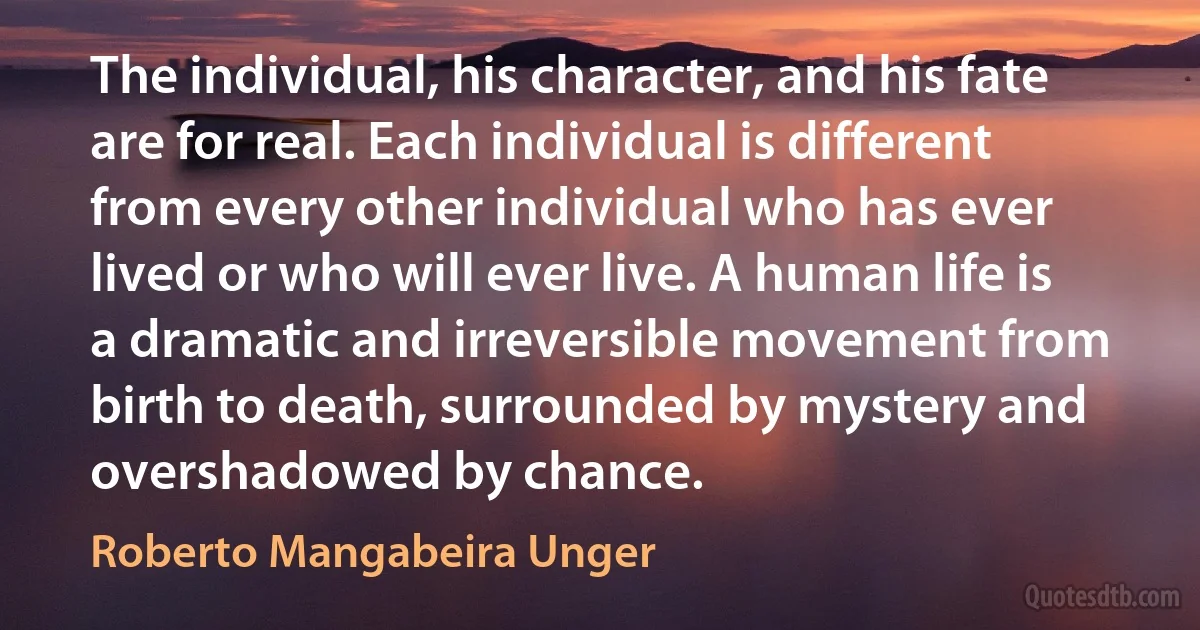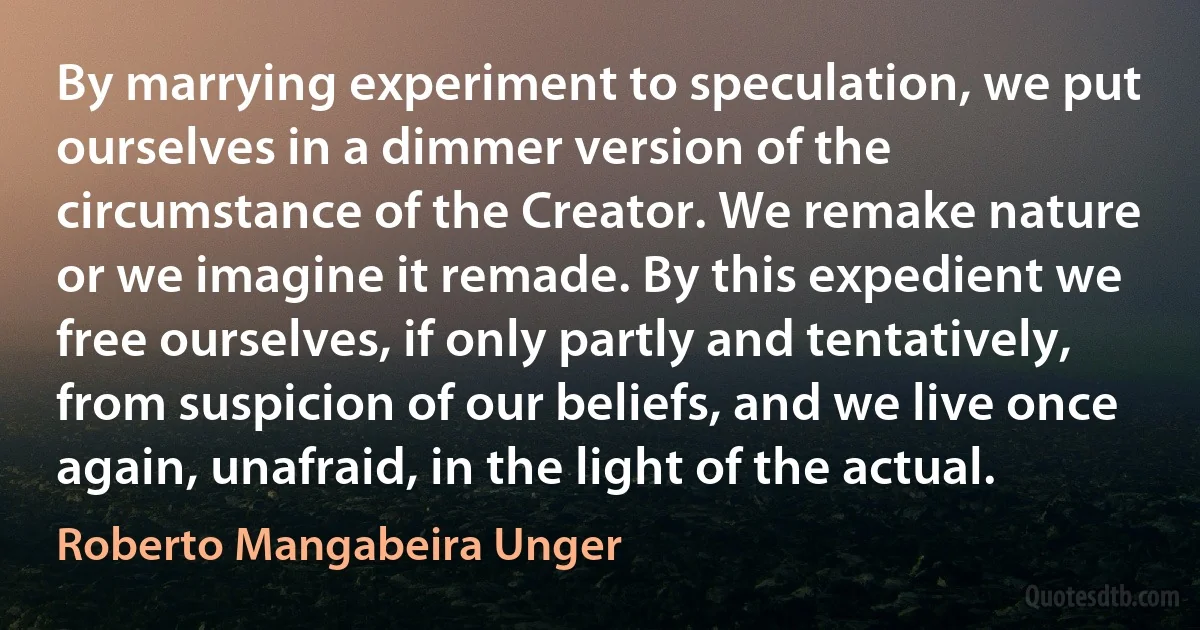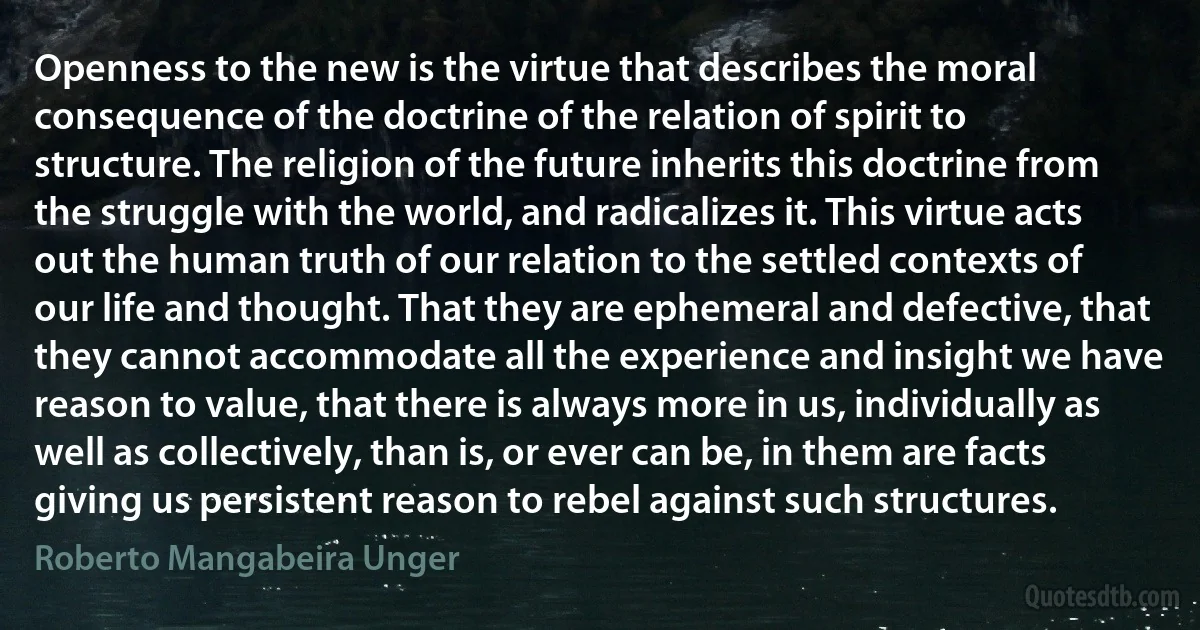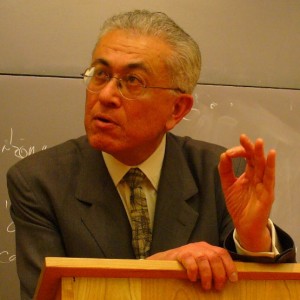Roberto Mangabeira Unger quotes - page 3
Democratic experimentalism sees the core of the good of human liberation in a softening of the tension between two great competing demands upon our vitality and greatnessː the need to engage in group life and the need to diminish the price, in subjugation and loss of self-identity, that we regularly pay for such engagement.

Roberto Mangabeira Unger
The structures of society and culture are fighting turned to stone; they are what comes into existence so long and insofar as we interrupt our practical and ideological struggles over the organization of life in society. When the fighting escalates again, the structures dissolve into the collective action and imagination from which they arose. When we fashion structures design to invite their own reconstruction, we make them into both superior instruments of our power and more faithful reflections of our humanity.

Roberto Mangabeira Unger
The movement of people and ideas is ... more than useful; it is sacrosanct. It forms part of the process by which the whole human race becomes both one and diverse, and makes itself more godlike, by affirming in the individual as well as in the species, its preeminence over the particular social and cultural worlds that it builds and inhabits. Both the movement of people and the movement of ideas can unsettle and frighten us, driving us back into ourselves. They can also inspire us to reimagine and to remake our interests, our ideals, and even our identities, by beginning to detach them from the settings with which we habitually associate them. Each of them is therefore an invitation to open ourselves to the new, in a world in which every man and woman has a better chance to become the original that he imagines himself to be.

Roberto Mangabeira Unger
By the structure of society, I mean the institutional and ideological presuppositions that shape the routine practices, conflicts, and transactions in that society, and that are largely taken for granted, even to the point of being invisible, as if they were part of the nature of things. In a free society, this institutional and ideological framework does not present itself as an alien fate beyond the reach of the transformative will and imagination.

Roberto Mangabeira Unger
A central thesis of this book is that the connection between thought and practice is most intimately and fully realized only when our minds are addressed to our own affairs-the concerns of humanity. When we direct our thoughts to nature, even if to see ourselves as fixtures of nature, we loosen the connection between thought and practice. When we loosen it, we are tempted to assume the posture I earlier called naturalism. We survey both the human and the nonhuman worlds from a supposedly godlike distance. We treat the achievement of such distance as the realization of our longing for transcendence.

Roberto Mangabeira Unger
The arrangements of society and culture are fighting petrified; they survive in the interruption or containment of practical and visionary strife. The more society and culture are organized to increase the distance between our context-preserving and our context-transforming activities, the more these arrangements take on the appearance of natural facts. They appear to us as givens, as our collective fate. Indeed, that is what, in a sense, they then become.

Roberto Mangabeira Unger
One of the greatest merits of the critical legal studies movement was to have created an intellectual space in which law and legal thought could be better used to resist the dictatorship of no alternatives. Its limited but important contribution to such resistance was the development of ideas about alternatives, made from the contradictions and variations in established law. The greatest failure of the movement was not to have embraced and executed this task more fully.

Roberto Mangabeira Unger
The search for this latent and living law-not the law of prescriptive rules or of bureaucratic policies, but the elementary code of human interaction-has been the staple of the lawyer's art wherever this art was practiced with the most depth and skill. What united the great Islamic ‘ulama', the Roman jurisconsults, and the English common lawyers was the sense they shared that the law, rather than being made chiefly by judges and princes, was already present in society itself. Throughout history there has been a bond between the legal profession and the search for an order inherent in social life. The existence of this bond suggests that the lawyer's insight, which preceded the advent of the legal order, can survive its decline.

Roberto Mangabeira Unger
This enlarged view of the radical cause ... allows us to connect leftism and modernism, the radical politics of institutional reform and the radical politics of personal relations, a political vision obsessed with issues of dependence and domination and a moral vision concerned with the inability of the individual to gain practical, emotional, or even cognitive access to other people without forfeiting his independence.

Roberto Mangabeira Unger
Humanity takes a long time to understand its relation to its structures of discourse and sociability. People have usually mistaken the forms of inquiry and discourse, exchange and community, to which they are accustomed for flawed approximations to the true face of reason or society. More often than not, they have cast this prejudice aside only to replace it with a more modest, halfhearted reformulation of the same belief.

Roberto Mangabeira Unger
The cultural revolutionary wants to show how roles can be stretched, pulled apart, combined with other roles, and used incongruously. He acts out of a loosened sense of what it means to occupy a role. In this way he helps disrupt frozen connections among social stations, life experiences, and stereotyped forms of insight and sensibility. He thereby carries into the drama of everyday personal relations the effort to free sociability from its script and to make us available to one another more as the originals we all know ourselves to be and less as placeholders in a system of group contrasts.

Roberto Mangabeira Unger
The reader should understand that this book forms a small part of a larger intellectual program: a struggle against fate through thought, an effort to give new meaning and new life to projects of individual and social liberation that for the last two hundred years have shaken and aroused the whole world, a fight to imagine the forms that those projects can and should take if they are to have a future.

Roberto Mangabeira Unger
In Brazil as in the United States, we find two voices of a New World promise of happinessː a promise to raise up human life to the exuberance of nature itself while breaking down the hierarchies and privileges that keep people distant from one another. A society of originals whose enhanced powers and self-possession enable them to accept one another more fully is the aim of this American and Brazilian dream. Translated into another, more universal vocabulary, this longing represents one form of the effort to reconcile a pagan ambition of greatness with a Christian idea of tenderness, purging the former of its impulse toward masterfulness and the latter of its knack for resentment. Thus, empowerment and solidarity can come more fully together.

Roberto Mangabeira Unger
Obama shared in the more philosophical part of the discussion as vigorously as he did in the more context-oriented part .... The impression you report, of impatience with speculative exploration, is false. It does justice neither to him nor to me to represent these conversations under the lens of philistine activist against starry-eyed theoretician. He was always interested in ideas, big and small.

Roberto Mangabeira Unger
A radicalized pragmatism is the operational ideology of the shortening of the distance between context-preserving and context-transforming activities. It is thus a program of permanent revolution-however, a program so conceived that the word "revolution” is robbed of all romantic otherworldliness and reconciled to the everydayness of life as it is.

Roberto Mangabeira Unger
... the impulse of iconoclasmː refusing unconditional reality and value to the contingent and flawed worlds we build and affirming that there will always be more in us, individually and collectively, than there can ever be in them. The most complete expression of this iconoclastic commitment is the development of forms of life and consciousness that provide us with the means and occasions to resist and reform them. In this way, they save us from having to choose between engaging wholeheartedly in them and keeping the last word, of resistance and transcendence, to ourselves.

Roberto Mangabeira Unger
To come out from under the protective wall of role, habit, and frozen perception, a person must throw himself into a situation of heightened exposure. He must put himself at greater risk to the harm that other people may do to him and to the destructive influence that enlarged experience may have on what he had previously regarded as his enduring core of identity.

Roberto Mangabeira Unger
The art of self-transformation for the sake of developing practical capabilities seems to have a similar content in the most varied historical circumstances. The Mamluks and the Normans suffered defeat because they failed to open up and readjust the organizational and social contexts of warfare. The Seljuqs succeeded because they did just that. The West African coastal kingdoms used an extraneous technological advantage to avoid having to change radically. But they could neither go on the offensive against the savanna states nor prepare themselves to resist their European patrons and trading partners.
In all these instances success seems to have required the dissociation and recombination of available models of the organizational and social context of military activity. To have succeeded would not have meant, for the Mamluks, becoming like the Ottomans; it would have meant creating an order that never existed before. To possess the alien, you must change it.

Roberto Mangabeira Unger
The problem of method ... includes four main issuesː the possibility of an alternative to logic and causation, capable of overcoming the inadequacies of both rationalism and historicism; the link between this third method and causality; the connection between the meaning of an act for its agent and its meaning for an observer; and the relationship of systematic theory to historical understanding.

Roberto Mangabeira Unger



 Born: March 24, 1947
Born: March 24, 1947
